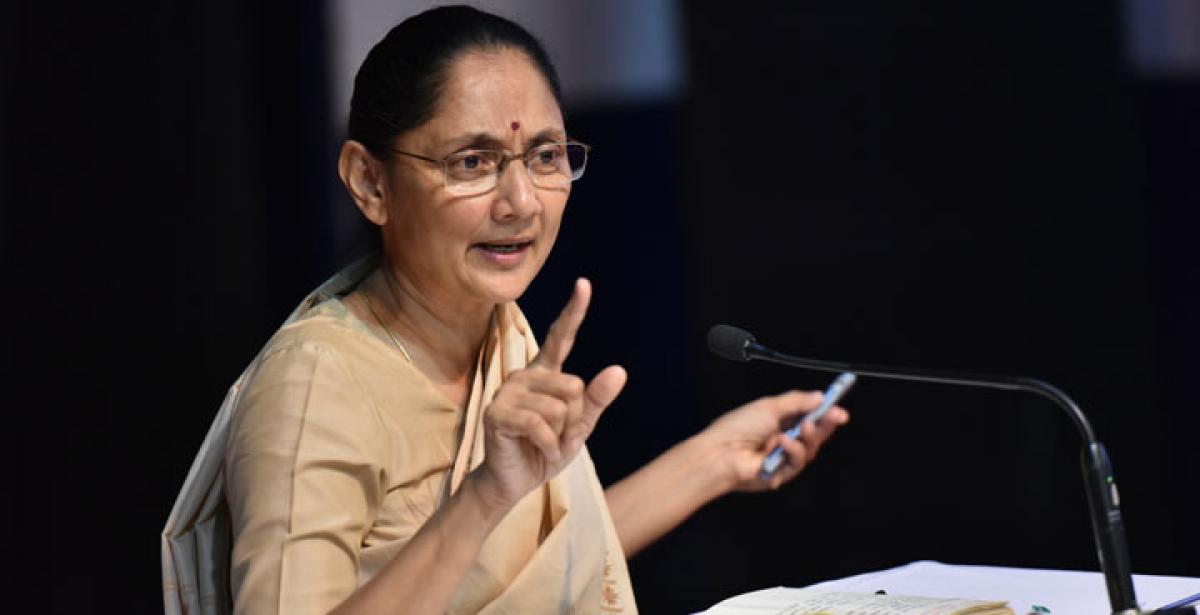Live
- GMR Airports Unveils AI-Powered Digital Twin Platform to Transform Airport Operations
- India poised to become leading maritime player: PM Modi
- Top Causes of Kidney Stones and How to Recognize Silent Symptoms
- India’s renewable energy capacity logs 14.2 pc growth at 213.7 GW
- Winter Session of Odisha Assembly adjourned sine die
- Biden calls Trump's tariff approach 'major mistake'
- After Drama Over Eknath Shinde’s Chief Minister Race, Maharashtra Cabinet Formation Faces New Tensions
- Egyptian FM, Blinken discuss recent developments in Syria
- Iran's supreme leader says Syria's developments result of US-Israeli 'plot'
- Elon Musk to Purchase $100 Million Luxury Mansion Next to Donald Trump's Mar-a-Lago, Report Reveals
Just In

There is no doubt that there is strife all around but in comparison to other countries, there are still some values left. Ours is not an alien culture, it is just that it is at lower ebb.
As part of the annual lecture series, Sunanda Leelaram also called Sunandaji, daughter of philosopher Swami Parathasarathy will be delivering lectures on chapter 10 of the Bhagavad Gita. The four-day discourse sessions from November 17 to 20 will cover verse wise detailed presentation of the chapter and looks to help people improve the quality of life. In a telephonic interview she speaks about issues that the modern human beings face
.jpg) India was always known as a tolerant country. Are we now becoming more and more intolerant?
India was always known as a tolerant country. Are we now becoming more and more intolerant?
There is no doubt that there is strife all around but in comparison to other countries, there are still some values left. Ours is not an alien culture, it is just that it is at lower ebb.
For instance, during Diwali people set aside their differences and come together. It is a matter of understanding and not tolerance. There is a need to understand others with an open mind.
Stress and lack of time are two issues that plague modern man. How does one deal with them?
There is something within that has to be managed. The ‘mind’ and the ‘intellect’ are both derived from Sanskrit. The former is ‘manas’ and the latter ‘buddi’. If you control the mind, you control the world.
The human mind has no direction and can wander like a ferocious river in full spate. If the river is not directed it would break the banks, so also the mind. Intellect is like muscle. If intellect is weak, the mind takes over. If mind is of unfulfilled desires it takes over, it makes it agitated.
The same principle applies to time. Time management is work management. Clarity of thought, prioritisation of work and how to access the work on hand will go a long way. Stress has nothing to do with the outside world, it is all within.
How is the Bhagavad Gita relevant to us today?
The world presents two distinct classes of people. One class is active, productive and prosperous. The western world seems to fit into this category. But by their own admission they have lost their peace of mind. The other class of people is relatively peaceful and happy but without much action.
Since they lack action they are not productive or prosperous. Some of the eastern countries face this problem. Thus there is action without peace on one side and peace without action on the other. With the knowledge of the Gita, you live a dynamic life while enjoying perfect peace and happiness within.
How difficult is it to get the youth to listen?
The young are more open, the problem is with older people who have fixed and pre-conceived notions. Listening is a technique and is not easy. The mind is so busy that the intellect is unable to grab all facts. The one with an open mind would receive better.
There are three stages to get rid of ignorance; sravana, manana and nididhyasana. Not just listening but receiving knowledge, reflecting on what one heard and ultimate self realisation. Listening, reflecting and acting are what help.
The picture of Arjuna and Krishna on a chariot is well-known. What is the significance?
The picture and the chariot have a deeper connotation. It is an allegory taken from the great Vedic text Kathopanishad. The chariot and horses represent the human body and sense organs. The reins symbolise the mind, the charioteer the intellect and the rider the individual.
If the charioteer falls asleep, the reins become loose and the horses go out of control. It results in the destruction of both the chariot and rider. So, when the intellect is not alert the mind loses control of the senses and the individual is destroyed. And, when the chariot is well-controlled by the charioteer, the rider is safe.
So also an individual is well-prepared when the mind and senses are controlled by his intellect. Lord Krishna represents one who has a well-developed intellect. Sunandaji will be speaking at Shankarji Memorial Hall at Exhibitions Grounds in Nampally from 6.30 pm to 8.00 pm.
By T P Venu

© 2024 Hyderabad Media House Limited/The Hans India. All rights reserved. Powered by hocalwire.com







